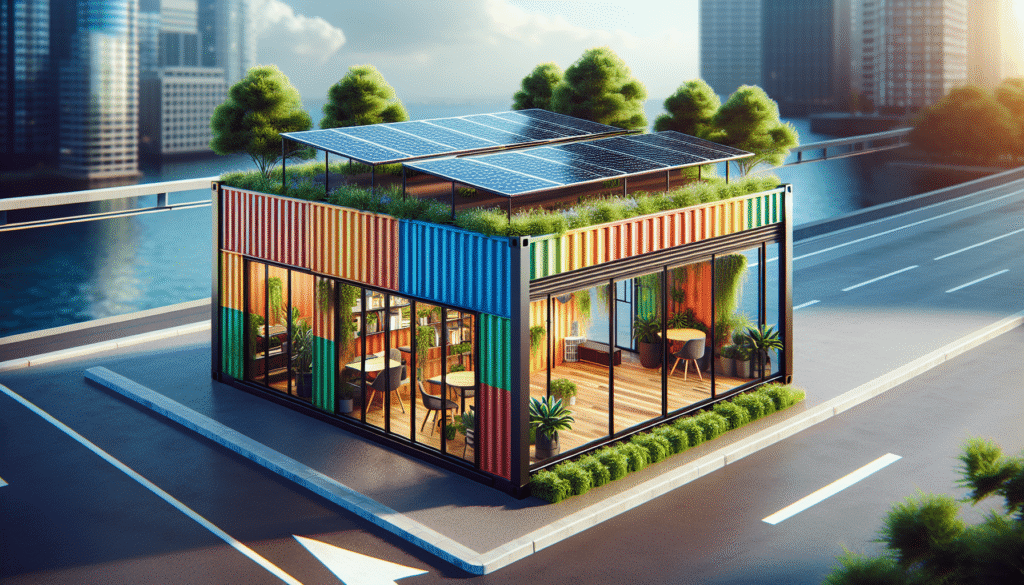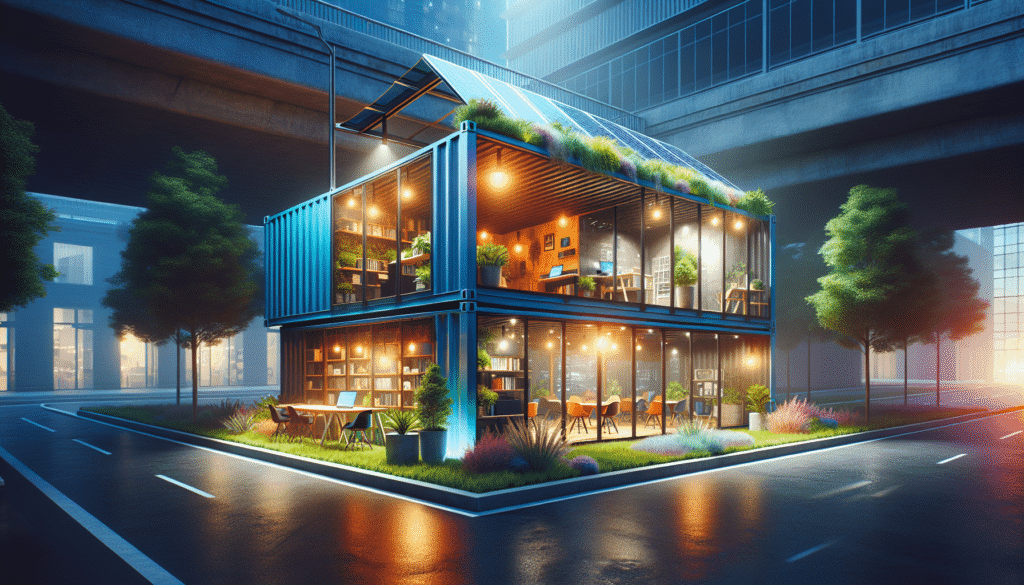Have you ever looked at a shipping container and wondered about its potential beyond mere transportation and storage? You’re not alone. The versatile and robust nature of shipping containers has led to an explosion of innovative business ideas, and entrepreneurs globally are tapping into their potential to create unique ventures. Let’s explore how you could harness the hidden potential of these steel structures to launch a business that’s not only creative but also environmentally friendly and cost-effective.

Understanding the Versatility of Shipping Containers
Shipping containers are typically made from durable steel, designed to withstand harsh sea conditions and protect their contents. But their utility extends far beyond that initial purpose. They offer structural integrity, are easily transportable, and can be modified for a variety of uses. When considering a shipping container business, you’re looking at a foundation that can be transformed into a plethora of practical and innovative applications.
The Environmental and Economic Benefits
One of the primary advantages of utilizing shipping containers is the environmental benefit. Repurposing these structures helps reduce waste, as millions of containers sit unused around the world. By recycling and reusing these containers, you’re contributing to sustainability while cutting down on initial material costs.
Economically, container-based projects can be cheaper than traditional building methods. The robustness of the containers reduces the need for extensive structural reinforcement, and with creative planning, they can be adapted to almost any spatial requirement. This opens countless avenues for business opportunities.
Business Ideas With Shipping Containers
The applications of shipping containers are as broad as your imagination. Here’s a look at some innovative business ideas that utilize their potential:
Shipping Container Homes
Housing is a fundamental human need, and shipping container homes offer an affordable and eco-friendly option. These homes can be standalone or part of a larger structure, and their modular nature allows for unique architectural designs. You could cater to eco-conscious individuals or those seeking cost-effective housing solutions.
Pop-Up Shops and Markets
The trend of pop-up shops is growing, and shipping containers provide an excellent platform. They’re secure, transportable, and customizable. You can create a pop-up café, retail store, or art exhibit. The mobility allows you to move with market demands, making it a versatile option for entrepreneurs.
Mobile Offices or Studios
With remote work gaining popularity, there’s a demand for mobile office spaces. Shipping containers can be transformed into sleek and functional office spaces or art studios. You can target freelance professionals, artists, or small startup teams looking for unique workspaces.
Urban Farming Initiatives
Urban agriculture is a burgeoning industry, and shipping containers can serve as controlled environments for growing food. Implementing hydroponic or aquaponic systems inside containers can lead to year-round production. Target urban centers where local and organic foods are in demand.
Cafés and Restaurants
Imagine enjoying a coffee in a cozy café made from a shipping container. The ability to easily modify the space allows for the integration of kitchen equipment and seating areas. Shipping container eateries are trendy and can be located in places conventional restaurants cannot easily access.
Education and Learning Centers
Shipping containers can be transformed into classrooms or learning centers, ideal for communities with limited infrastructure. These can be deployed in remote areas to provide education facilities, offering a durable and climate-resilient solution to educational needs.
Tiny Luxury Hotels
Tap into the tiny home movement by transforming shipping containers into luxury hotel rooms. Each container can be a self-contained unit with a bedroom, bathroom, and kitchenette, providing a unique experience for travelers seeking eco-friendly and boutique accommodations.
Storage Facilities
While perhaps more traditional, storage businesses using shipping containers are still highly profitable. You can create a storage rental business offering safe and secure spaces for individuals and companies to store their valuables.
Steps to Start Your Shipping Container Business
Market Research and Idea Validation
Before diving in, it’s crucial to conduct comprehensive market research. Identify your target audience and understand their needs and preferences. Look at competitors and evaluate their offerings. Testing your idea with a small pilot project can provide invaluable feedback and insight.
SWOT Analysis
A SWOT analysis can help you understand the Strengths, Weaknesses, Opportunities, and Threats related to your business idea. This strategic planning technique provides a framework to identify the internal and external factors that may impact your project.
| Strengths | Weaknesses | Opportunities | Threats |
|---|---|---|---|
| Durable structure | Limited space | Growing demand for eco-friendly solutions | Regulatory hurdles |
| Cost-effective | Requires creativity for design | Mobility and flexibility | Market competition |
Acquire and Modify Containers
Once you’ve settled on your business idea, the next step is acquiring shipping containers. Look for reputable suppliers and ensure the containers meet safety and structural standards. The modification stage is where your vision comes to life; work with architects or designers if necessary to ensure that modifications adhere to building codes and regulations.
Legal Considerations and Permits
Understanding the legal landscape is critical. You need to secure the necessary permits and licenses, which can vary vastly depending on your location and the nature of your business. Consulting with legal experts or local authorities can streamline this process.
Develop a Marketing Strategy
Attracting customers requires a well-thought-out marketing plan. Utilize both digital marketing channels like social media and SEO, and traditional methods like flyers and local networking. Highlight what makes your shipping container business unique and environmentally conscious.
Financial Planning and Funding
Starting a shipping container business requires capital. Develop a detailed budget that outlines all potential expenses and revenue streams. Explore various funding options, such as loans, investors, or crowdfunding, to cover the initial costs.
Overcoming Challenges and Maximizing Success
Addressing Customer Concerns
Potential customers might have concerns about the safety, durability, and aesthetics of shipping container structures. Address these proactively by offering tours, taste-testing your products or services, and sharing testimonials from satisfied customers.
Keeping Up with Trends
The business landscape is ever-changing, and staying updated with trends is essential. Join industry forums, attend trade shows, and network with peers to stay informed and innovative in your offerings. Regularly updating your business according to the latest trends will keep it relevant and appealing.
Sustainability as a Priority
Emphasizing sustainability not only benefits the planet but also appeals to a growing segment of eco-conscious consumers. Incorporate sustainable practices such as using solar panels or rainwater harvesting systems in your shipping container modifications.
Quality Control and Safety
Ensuring that your products or services meet quality standards is non-negotiable. Implement regular checks and maintenance procedures, especially if you’re operating a food business or residential facilities, to maintain high safety and quality levels.

Future Possibilities and Innovations in Shipping Container Businesses
Shipping containers have already come a long way since being mere cargo carriers. With continuous innovation, the possibilities for these structures are expanding. The future could see advancements in smart technology integration, automated systems, or even AI-driven modifications.
Imagine shipping container homes with smart technology that adjusts the climate control and lighting based on occupancy and weather conditions. Or consider container farms equipped with AI systems to optimize plant growth and resource use.
Innovation is at the heart of utilizing shipping containers, making them a foundation for pioneering projects and businesses. By tapping into this potential, you can establish a business that not only meets market demands but is also a leader in sustainability and creativity.
In conclusion, the adaptability, cost-effectiveness, and sustainability of shipping containers make them an excellent choice for entrepreneurs looking to innovate in various sectors. Whether you want to create a unique retail experience, provide affordable housing, or contribute to the urban farming movement, shipping containers offer a versatile solution. As the world increasingly looks for eco-friendly and efficient alternatives, entering the shipping container business could be your path to a successful and impactful future.

